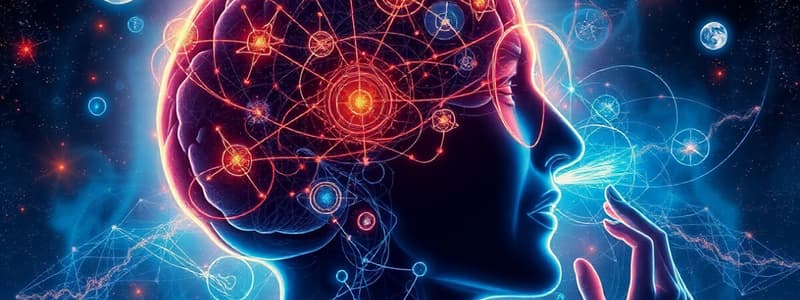Podcast
Questions and Answers
What defines empirical knowing?
What defines empirical knowing?
- Reliant on consensus and intuition
- Grounded in systematic observation and experimentation (correct)
- Focuses on anecdotal evidence and beliefs
- Based on personal experiences and authority
Which characteristic is NOT associated with pseudoscience?
Which characteristic is NOT associated with pseudoscience?
- Relies on anecdotal evidence
- Lacks falsifiability
- Evidence-based (correct)
- Resistant to change with new evidence
Which of the following is NOT a goal of science?
Which of the following is NOT a goal of science?
- Explain underlying mechanisms of behavior
- Accept authority without question (correct)
- Predict behavior
- Identify causes of behavior
What is a necessary criterion for establishing causation?
What is a necessary criterion for establishing causation?
Which of the following describes operationalization in research?
Which of the following describes operationalization in research?
Which type of validity assesses the accuracy of measurement within a study?
Which type of validity assesses the accuracy of measurement within a study?
In a research design, what is a case study primarily used for?
In a research design, what is a case study primarily used for?
Which characteristic is NOT needed for a good theory in psychological research?
Which characteristic is NOT needed for a good theory in psychological research?
What aspect distinguishes empirical knowing from ordinary knowing?
What aspect distinguishes empirical knowing from ordinary knowing?
Which characteristic is crucial for science to be considered valid?
Which characteristic is crucial for science to be considered valid?
What is the first step in the research process?
What is the first step in the research process?
Which type of variable is manipulated during an experiment?
Which type of variable is manipulated during an experiment?
What type of validity evaluates the extent to which results can be generalized to real-world settings?
What type of validity evaluates the extent to which results can be generalized to real-world settings?
Which of the following is NOT a necessary condition for establishing causation?
Which of the following is NOT a necessary condition for establishing causation?
What characteristic is pivotal for a good theory beyond being testable?
What characteristic is pivotal for a good theory beyond being testable?
Which of the following best describes a case study in psychological research?
Which of the following best describes a case study in psychological research?
Flashcards
Empirical Knowing
Empirical Knowing
Knowledge based on systematic observation, evidence, and experimentation.
Ordinary Knowing
Ordinary Knowing
Knowledge based on personal experience, intuition, authority, consensus, or logical speculation.
Falsifiable (Science)
Falsifiable (Science)
A scientific statement must be able to be proven wrong.
Causation (Psychology)
Causation (Psychology)
Signup and view all the flashcards
Independent Variable (IV)
Independent Variable (IV)
Signup and view all the flashcards
Dependent Variable (DV)
Dependent Variable (DV)
Signup and view all the flashcards
Internal Validity
Internal Validity
Signup and view all the flashcards
Reliability (Research)
Reliability (Research)
Signup and view all the flashcards
Pseudoscience
Pseudoscience
Signup and view all the flashcards
Anecdotal Evidence
Anecdotal Evidence
Signup and view all the flashcards
Falsifiability
Falsifiability
Signup and view all the flashcards
Predict Behavior
Predict Behavior
Signup and view all the flashcards
Temporal Precedence
Temporal Precedence
Signup and view all the flashcards
Covariation of Cause and Effect
Covariation of Cause and Effect
Signup and view all the flashcards
Construct Validity
Construct Validity
Signup and view all the flashcards
Study Notes
Empirical vs. Ordinary Knowing
- Empirical knowing relies on systematic observation, evidence, and experimentation (like science).
- Ordinary knowing uses subjective methods like personal experiences, intuitions, authority (trusting credible sources), consensus (popular agreement), and logical speculation.
Science vs. Pseudoscience
-
Science characteristics:
- Evidence-based
- Falsifiable (able to be proven wrong)
- Systematic and testable
-
Pseudoscience characteristics:
- Lacks falsifiability
- Relies on anecdotal evidence
- Resistant to change despite new evidence
- Overemphasizes confirmation over refutation
Goals of Science
- Describe behavior: Observing and cataloging behavior patterns.
- Predict behavior: Identifying conditions where behaviors are likely to occur.
- Identify causes of behavior: Establishing cause-and-effect relationships.
- Understand/explain behavior: Explaining underlying mechanisms and theories.
Psychology as a Science
- Psychology is a necessary science, using empirical methods and systematic approaches.
- Psychology is a sufficient science when applying rigorous methodology.
- Criterion for causation in psychology requires:
- Temporal precedence (cause happens before effect)
- Covariation of cause and effect (when cause changes, so does effect)
- Elimination of alternative explanations
Steps of Research
- Hypothesis formation.
- Characteristics of good theories: comprehensive, heuristic (inspire new research), testable, parsimonious (simple and concise), and integrative.
- Operationalization: Defining variables in measurable terms.
- Variables: independent (manipulated), dependent (measured).
- Research design: experiment (manipulation and control), correlation (relationship), case study (in-depth analysis of a single case).
Validity in Research
- Reliability: Consistency of results.
- Types of validity:
- Internal validity: Cause-and-effect within the study.
- External validity: Generalizability to real-world settings.
- Construct validity: Accuracy of measurement.
- Threats to validity: extraneous variables (uncontrolled factors), design flaws (e.g., history, maturation, testing effects).
APA Ethics Code
- General principles: Ethical guidelines for research conduct, including informed consent and avoiding plagiarism.
Additional Information
- Standards (Section 8): Specifics for research and publication, including informed consent and avoiding plagiarism.
- APA Style: Refer to Purdue OWL or Kuther Chapter 8 for citation format details.
- Key Readings: Stanovich (2019) for scientific thinking in psychology, and Kuther (2020) for fundamental knowledge.
Studying That Suits You
Use AI to generate personalized quizzes and flashcards to suit your learning preferences.
Related Documents
Description
This quiz explores the differences between empirical and ordinary knowing, along with distinguishing science from pseudoscience. Understand the critical elements of scientific inquiry and its goals in describing, predicting, and explaining behavior. Test your knowledge on these fundamental concepts in psychology.




